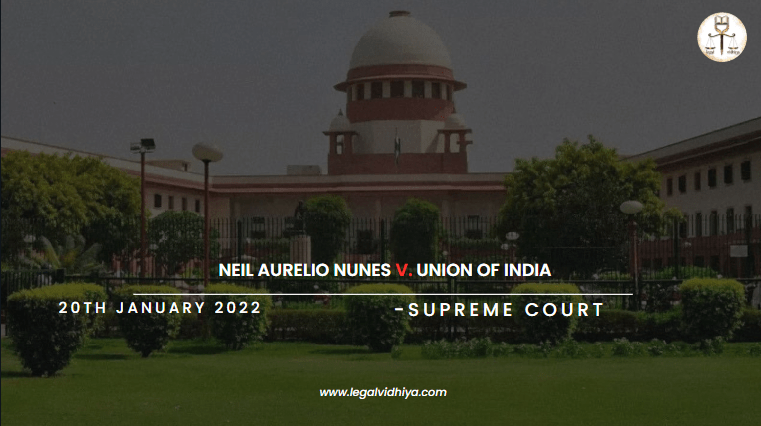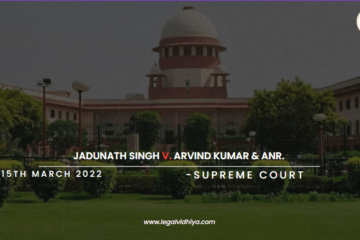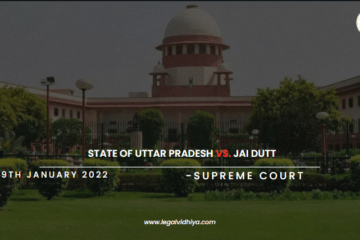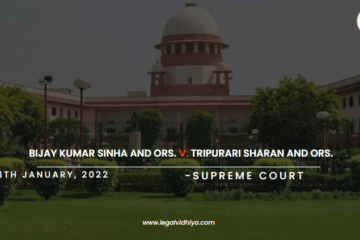
INTRODUCTION :
The Supreme Court gave judgment on the case on 20th January 2022.
The Reservation has remained a topic of intense debate and controversy. India has witnessed various reservation controversies, particularly related to caste-based reservations. The debate revolves around issues like social justice, meritocracy, and representation. The reservation system, initially intended to uplift marginalized communities, has faced criticism for potential misuse and concerns about fairness Issues related to reservation in NEET and other exams have always revolved around major concern of equitable representation and access to right to equality and education.
In this case, the Bench of the Supreme Court consists of Justice D.Y. Chandrachud and Justice A.S.Bopanna. The judgement given by the bench upholds the validity of reservation given to Other Backward Classes in All India Quota of medical college seats allotted under National Eligibility cum Entrance Test. Central Government came with the notification of giving reservation to O.B.C., S.C., S.T. Community during entrance admission test. In AIQ. 85% is already reserved with the respective state government and in the remaining 15% , the government wants to provide 27% to O.B.C. , 7% to SC’s. 7.5% to S.T.’s10% to E.W.S. On this announcement by the central government widespread protests occurred in all over India. Government and supporters argued that it is necessary for the benefit and welfare of the depressed classes in the country. However, those who are against questioned about the Constitutional concept of equality and justice for all citizens without any discrimination.
The Supreme Court observed that Article 16(1), 16(4), Article 15(4) of the Constitution provide the power and rights to achieve “substantive equality” in the society. The Constitution argued for Equity instead of equality in terms of reservation. The judgement upheld the reservation for Other Backward Classes, in All India Quota category for UG and PG medical and dental courses as constitutionally valid.
Facts of the Case
In the academic year 2021-22, Union Ministry of Health and Family Welfare announced 10% EWS reservation and 27% OBC quota would be applied to 15% and 50% PG seats in the All India Quota (AIQ). The Supreme Court in case Dr. Pradeep Jain Vs. Union of India gave guidelines to provide domicile free states in State run medical and dental institutions. At present, 15% UG seats and 50% PG seats in State run institutions are filled on the basis of merit of candidates. Remaining 85% are reserved with the State Government for the candidates domiciled in respective states.
The petition was first filed in Tamil Nadu, in the state 50% reservation was given to Other Backward Classes in State run medical and dental institutions via AIQ Seats. The Writ petition – Mandamus was filed by the state party Dravida Munnetra Kazhagam to provide reservation to OBC candidates in AIQ seats. The writ was further challenged in the court and argued the reservation for OBC and EWS in the AIQ seats shouldn’t be provided as it violates the Right to Equality and other rights and provisions of the Constitution. The government introduced The Central Educational Institutions (Reservation in Admission)Act in 2006 which provides reservation for students belonging to SCs , STs and OBCs in Central Educational Institutions. The scheme as per act is that 15% seats shall be reserved for SCs 7%, STs 7.5% and OBC 27% in central educational institutions.
In Tamil Nadu, the State Government announced 50% reservation to OBCs in all state running medical institutions under Tamil Nadu Backward Classes, Scheduled Castes and Scheduled Tribes (Reservation of seats in Educational Institutions and of Appointments or Posts in the Services under the State) Act introduced in 1993. In 2020, DMK. Party filed a writ petition of Mandamus to provide OBC reservation in AIQ. The case was then transferred to Madras High Court jurisdiction. On 27/07/2020 court held that there is no legal or constitutional bar on extending reservation to OBCs against the AIQ seats in medical colleges of Tamil Nadu.
On 29/07/2021, Directorate General of Health Services, Ministry of Health and Family Welfare issued a notification to implement 27% OBC reservation and 10% EWS reservation in 15% UG and 50% PG AIQ seats for the academic session of 2021-22.
In the present case, a petition was filed against the reservation provided to OBC in the Supreme Court.
Issues Of the Case
The issue of providing reservation to OBC candidates under AIQ seats raise a question whether it is Constitutionally valid or invalid?
Does the inclusion of reservations for the OBC community in the All-India Quota for Postgraduate NEET compromise merit and pose a threat to national interest?
CONTENTION OF PETITIONER
The petitioner counsel was represented by Shyam Divan. He argued that in All India Quota category there must be no reservation as it will violate the previous judgement given by Supreme Court in Pradeep Jain v. Union of India, serious concerns were raised about reservation in PG seats, arguing that once a person becomes a doctor, they should not be considered backward anymore, and PG admissions must be based solely on merit. Reservation at the PG and super speciality levels is detrimental to national interest since specialized skills cannot be acquired by everyone.
The counsel further argued that reservation notification by the government was issued when the academic session 2021-22 admission window was closed therefore, the application and implementation of reservation is unlawful.
CONTENTION OF RESPONDENT
The respondent counsel was represented by Solicitor General Tushar Mehta and Addittional Solicitor General KM.Nataraj. They argued that the reservation was implemented before the date of exams were held and prior to counselling procedure, therefore there is no scope of anything unlawful and the rules were not modified before the commencement of the game.
In 2007 act was passed by the parliament, Central Educational Institutions (Reservation in Admissions) Act 2006. It provided 27% reservation to OBCs in all central educational institutions and schemes. The All India Quota in NEET is a central level list therefore the reservation should be implemented.
They further argued that merit shouldn’t be measured solely in terms of marks.
In Pradeep Jain case it was held that there would be no domicile-based reservation in AIQ seats, but it did not bar other forms of reservation.
JUDGEMENT OF THE COURT
The Supreme Court observed that the Reservation policy neither constitutes any sort of inequality in the society nor it violates any fundamental right to equality of constitution. It works for the fulfillment of the concept of Equity. The special provision of reservation is made for the advancement of Backward Classes of the society. The concept of making special provisions for the backward classes is reaffirmed by the nine Judge Bench in Indira Sawhney V. Union of India.
Articles 15(4) and 15(5) are not exceptions to Article 15(1), but rather a restatement of the principle of substantive equality, which recognizes existing inequalities and allows for group identification to achieve equality.
The Court held that an competitive exam should ensure formal equality where everyone has an equal opportunity to participate. But in society, inequality still exist in various forms therefore it limits the access of various classes of society to actively participate.
The Supreme Court further explained that the reservation in PG courses is not invalid.The backwardness of a candidate doesn’t disappear just after clearing the graduation. The AIQ scheme was designed to allow students from across the country to compete for state-run medical and dental institutions. The observations in Pradeep Jain only applied to residence-based reservation, not reservation in AIQ seats as a whole.
The Bench gave its decision and uphold the reservation policy as Constitutionally valid for providing 27% reservation quota to Other Backward Classes in NEET All India Quota (AIQ) seats for UG and PG medical and dental institutions.
CONCLUSION
Social justice is the ultimate goal of the Indian Constitution. It involves not only doing redistributive equality rather also uplifting the backward communities who have been denied their fundamental rights by the forward classes.
In the case of Neil Aurelio Nunes and Ors. v. Union of India and Ors., the Supreme Court of India upheld the constitutional validity of reservations for Other Backward Classes (OBC) and Economically Weaker Section (EWS) in the All-India Quota (AIQ) seats for medical courses. The Court emphasized the principle of substantive equality, recognizing the need to address structural barriers faced by backward classes to ensure equal access to educational resources and opportunities.
Written by Muskan Sharma an intern under legal vidhiya
Disclaimer: The materials provided herein are intended solely for informational purposes. Accessing or using the site or the materials does not establish an attorney-client relationship. The information presented on this site is not to be construed as legal or professional advice, and it should not be relied upon for such purposes or used as a substitute for advice from a licensed attorney in your state. Additionally, the viewpoint presented by the author is of a personal nature.




0 Comments